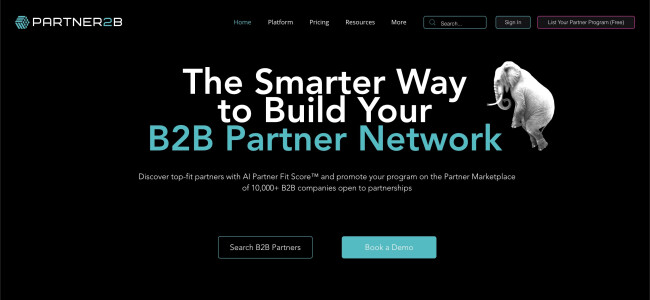No products in the cart.
LegalRoids
Unlocking Business Potential The Role of AI B2B Partners

In today’s rapidly evolving marketplace, businesses are constantly searching for innovative solutions to improve their efficiency and drive growth. One of the most transformative changes in recent years is the integration of AI technologies into business-to-business (B2B) partnerships. AI B2B Partner solutions offer significant advantages for organizations looking to enhance their operations, streamline processes, and strengthen collaboration. This article explores the key benefits and applications of AI in B2B partnerships, outlining how organizations can leverage these technologies to unlock their full business potential.
Understanding AI B2B Partnerships
AI B2B partnerships involve collaborations between businesses that utilize artificial intelligence technologies to create value and drive efficiency. These partnerships can take on various forms, including software solutions, platforms for data sharing, and collaborative ventures that leverage advanced analytics. By integrating AI capabilities, organizations can transform traditional B2B relationships into strategic alliances that enhance problem-solving and innovation.
The Benefits of AI Integration in B2B
1. Increased Efficiency
One of the most significant benefits of adopting AI solutions in B2B partnerships is the increase in operational efficiency. Automated processes minimize the time spent on mundane tasks, freeing employees to focus on higher-value activities. For example, AI-driven platforms can automate data entry, order processing, and customer service inquiries, significantly reducing response times and operational costs.
2. Enhanced Data Analysis
Data is a core component of successful business strategies, and AI excels at analyzing vast quantities of information. By partnering with AI providers, businesses can gain insights into customer behavior, market trends, and operational performance. These insights can inform better decision-making, allowing organizations to adapt to changing market conditions swiftly.
3. Personalized Customer Engagement
AI technologies enable B2B partners to deliver highly personalized services. Through machine learning algorithms, organizations can analyze client preferences and behaviors, tailoring their offerings to meet specific needs. This level of customization enhances customer satisfaction and loyalty, leading to long-term business relationships.
4. Predictive Analytics and Forecasting
Predictive analytics powered by AI allows businesses to forecast future trends and behaviors with greater accuracy. This capability can significantly enhance demand planning, inventory management, and resource allocation. By anticipating changes in the market or customer needs, businesses can position themselves more advantageously compared to their competitors.

Key Applications of AI in B2B Partnerships
1. Supply Chain Optimization
AI technologies can revolutionize supply chain management by offering real-time data analytics, demand forecasting, and inventory optimization. Through machine learning algorithms, businesses can identify inefficiencies in their supply chains and proactively address them, leading to reduced costs and improved service levels.
2. Enhanced Collaboration Tools
Collaboration is at the heart of successful B2B partnerships. AI-enabled tools can facilitate real-time communication and project management, enhancing collaboration across teams and organizations. Natural Language Processing (NLP) technologies enable more effective communication, breaking down language barriers and ensuring that all partners are on the same page.
3. Risk Management
In any business relationship, understanding and mitigating risk is essential. AI can assist in identifying potential risks by analyzing data patterns and trends, alerting partners to possible challenges before they escalate. By implementing proactive risk management strategies, businesses can safeguard their interests and maintain strong partnership dynamics.
4. Fraud Detection and Security
With the increasing reliance on digital transactions and online collaborations, security has become paramount for businesses. AI technologies can enhance fraud detection mechanisms by identifying unusual patterns and behaviors in transactions, providing businesses with an additional layer of security to protect sensitive data and financial resources.
Best Practices for Implementing AI in B2B Partnerships
While the potential benefits of AI B2B partnerships are significant, successful implementation requires careful planning and execution. Here are some best practices to consider:

1. Define Clear Objectives
Before integrating AI solutions, businesses should define their objectives clearly. Whether it’s improving efficiency, enhancing customer experience, or reducing costs, setting measurable goals will help guide the deployment of AI technologies.
2. Choose the Right Technology
Not all AI solutions are created equal. Organizations should conduct thorough research to identify the technologies that best fit their needs. Factors to consider include scalability, compatibility with existing systems, and user-friendliness.
3. Foster a Culture of Collaboration
Successful AI integration requires collaboration not only within the organization but also among partners. Encouraging open communication and collaboration will help ensure that all stakeholders are aligned and share a common vision for success.
4. Invest in Training and Development
Implementing AI technologies involves a learning curve for employees. Providing adequate training and resources will empower staff to make the most of the new tools at their disposal, maximizing the potential benefits of AI integration.
The Future of AI B2B Partnerships
As AI technologies continue to evolve, the landscape of B2B partnerships will likely transform in tandem. Innovations in machine learning, automation, and data analytics will provide new opportunities for businesses to collaborate more effectively and drive growth. Companies that embrace AI and prioritize strategic partnerships will be well-positioned to lead in their industries, delivering greater value to their customers and stakeholders.
Conclusion
In conclusion, AI B2B partnerships represent a significant opportunity for organizations looking to enhance their business strategies and operational efficiencies. By leveraging the power of AI, companies can unlock new capabilities, gain valuable insights, and ultimately drive growth. As the business landscape becomes increasingly competitive, embracing AI technologies and fostering collaborative partnerships will be key to success in the future.
